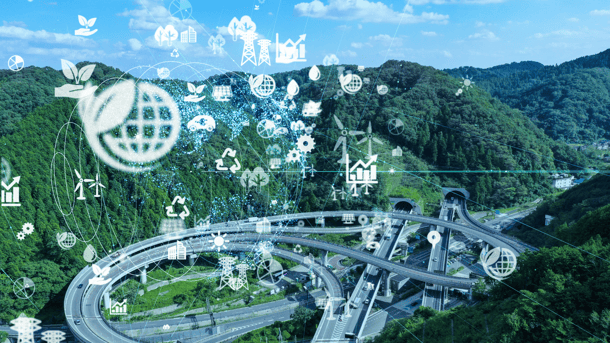

The Crucial Role of International Trade in Achieving Net Zero – An Energy Sector Perspective

Sustainability and Innovation
Achieving net-zero emissions requires a collective effort across various sectors and strong collaboration between individuals, governments, and businesses. However, the public sector has a pivot role to play in it. Around the world, governments are increasingly implementing policies focused on initiatives to incentivize businesses to adopt sustainable practices and reduce their environmental impact. While international trade poses environmental challenges, it also offers immense opportunities to accelerate the transition towards a net-zero economy.
International trade and its sustainability dilemma
 International trade has undeniably fuelled economic growth, fostered innovation, and connected nations across the globe throughout history. Collaborative efforts and knowledge sharing enable countries to accelerate the development and deployment of clean technologies. However, despite its positive impact, international trade also contributes significantly to global greenhouse gas emissions, primarily through the transportation of goods and the carbon-intensive nature of certain industries. By embracing sustainable trade practices, businesses can play a crucial role in reducing their carbon footprint and supporting the transition to a net-zero emissions economy.
International trade has undeniably fuelled economic growth, fostered innovation, and connected nations across the globe throughout history. Collaborative efforts and knowledge sharing enable countries to accelerate the development and deployment of clean technologies. However, despite its positive impact, international trade also contributes significantly to global greenhouse gas emissions, primarily through the transportation of goods and the carbon-intensive nature of certain industries. By embracing sustainable trade practices, businesses can play a crucial role in reducing their carbon footprint and supporting the transition to a net-zero emissions economy.
Worldwide consumers are increasingly prioritizing environmental friendly products and solutions. Businesses that have or are incorporating sustainability aspects in their products, services and operations are gaining competitive edge in the global marketplace. By aligning strategies with net-zero goals, companies can attract conscious consumers, investors, and partners, fostering market demand for sustainable solutions. Although the desire and willingness of businesses to become more sustainable is no longer a discussion for the future, but a matter of the now, the high costs of doing so could prevent companies from transitioning.
Financial solutions such export credit insurance and project financing have the power to assist businesses in adopting sustainable practices. From renewable energy solutions to energy-efficient manufacturing processes, technological innovation driven by international trade can drive significant progress in achieving net-zero emissions.
The energy sector’s role in the road-map to Net-Zero
The electricity sector plays a crucial role in the endeavor to achieve net zero emissions by 2050. As one of the highest emitting sectors, it is also tasked with facilitating the electrification of the global economy. Therefore, the electricity sector must be the first to attain net zero emissions, potentially as early as 2035 for advanced economies. However, this is an immense challenge that requires a comprehensive transformation. 
Presently, coal remains the dominant source of power generation and a strong contributor to CO2 emissions. Despite plans to phase out coal-fired power by many governments, setbacks such as the switching from gas to coal due to higher gas prices and a strong post-pandemic economic recovery are delaying plans. Overcoming these obstacles is vital for progress. To replace fossil fuel-based power generation and successfully transition to net zero, significant expansion of renewable energy generation capacity, electricity grids, and battery storage is imperative. While there has been an encouraging surge in investment in renewable energy generation triggered by the recent energy crisis, there still exists a considerable global shortfall in annual investments.
Technological innovation in the electricity sector is progressing slowly. Much depends on the development of the carbon capture, utilisation and storage (CCUS) emission reduction technology that can be applied to coal, natural gas and biomass fired plants, but also to other sectors and applications such as heavy industry and hydrogen production. There is some criticism on this technology because it extends the life of carbon intensive power plants. Yet, a failure to develop CCUS on time, could require vast amounts of additional investment in renewable energy capacity by 2050.
Concerns arise regarding the progress of the power sector transition, which poses challenges to achieving the overarching global net zero emissions target. Many countries with the highest emissions still have a significant gap between their desired net zero outcomes and the policies they have announced. While governments, especially in the United States and the European Union, have intensified their support for the energy transition, further efforts are required to expedite the greening of the power sector. Ambitious programs and increased financial support from both public and private sources are needed to drive the necessary changes.
Export Credit Agencies: Enablers of Sustainable Trade
 Export credit agencies (ECAs) like Atradius DSB play a crucial role in supporting exporters and facilitating sustainable international trade. These agencies provide financial solutions and risk mitigation tools that enable businesses to expand their global presence while adhering to sustainable practices.
Export credit agencies (ECAs) like Atradius DSB play a crucial role in supporting exporters and facilitating sustainable international trade. These agencies provide financial solutions and risk mitigation tools that enable businesses to expand their global presence while adhering to sustainable practices.
Atradius DSB's Green Cover product, for example, is designed to provide insurance and financing solutions for sustainable projects and investments. By offering coverage specifically tailored to sustainable initiatives, Atradius DSB supports businesses in implementing environmentally friendly practices that can positively contribute to NetZero. The Dutch Good Growth Fund (DGGF), another product offered by Atradius DSB, is also an example of government-backed financing that supports sustainable trade projects in developing countries. This initiative aims to promote sustainable economic growth while addressing environmental and social challenges. Through initiatives like Green Cover and DGGF, Atradius DSB enables Dutch exporters to navigate the challenges of sustainable trade, access financing, and mitigate risks associated with international transactions.
Atradius DSB economists have assembled a detailed report that brings together key opportunities and challenges in the pursuit of Net Zero within the power sector. Their findings and economic insights provide businesses with a clear understanding of the opportunities and threats associated with achieving NetZero in the years ahead.


